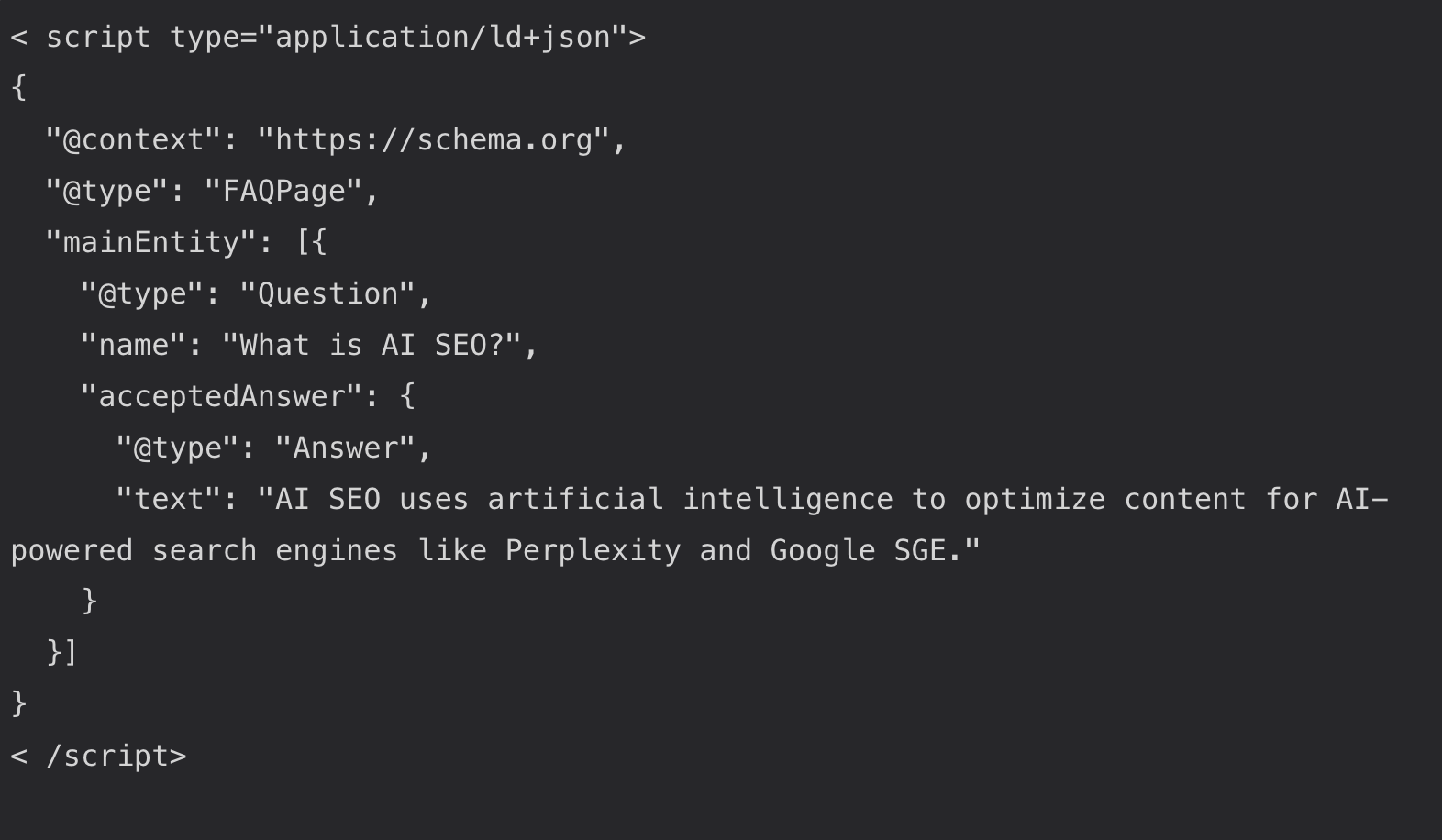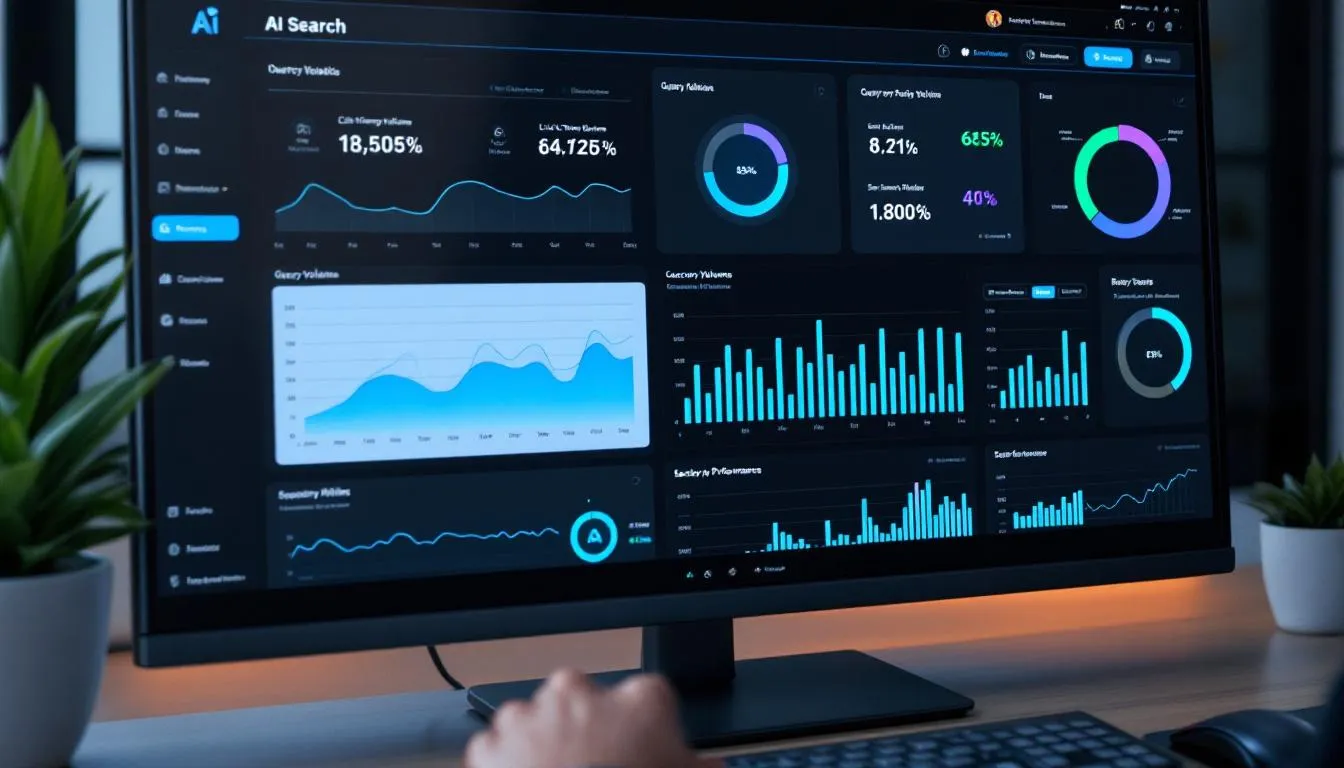AIO Guide for 2025: Master Artificial Intelligence Optimization
The search landscape has fundamentally changed. While 60% of Google searches now end without clicks due to AI-powered summaries and featured snippets, a new opportunity has emerged for savvy marketers. These summaries and snippets are often generated by AI overviews, such as Google AI Overviews, which summarize and highlight top sources in search results. Artificial intelligence search engine optimization represents the next evolution of digital marketing. This new era, known as ai driven seo, leverages AI technologies to revolutionize keyword research, content creation, personalization, predictive analytics, and overall SEO strategy. Being cited by AI platforms like Perplexity, ChatGPT, and Google’s Search Generative Experience (SGE) can be just as valuable as traditional Google rankings, as both play a crucial role in driving visibility and traffic.
This comprehensive guide reveals how AI-powered search engines are reshaping SEO strategies and provides actionable insights to help you adapt. You’ll discover the essential techniques, tools, and metrics needed to succeed in the evolving AI search landscape, backed by real data showing 67% traffic increases for businesses that properly implement these strategies.
Key Takeaways
AI-powered search engines like Perplexity, ChatGPT, and Google’s SGE are fundamentally changing how users find information
Traditional keyword-focused SEO is evolving toward AI-driven strategies that prioritize user intent and content quality
SEO optimization using AI-powered tools is essential for adapting to evolving search engine algorithms and achieving higher visibility in search results
AI-driven SEO strategies are crucial for improving a website's visibility across both traditional and AI-powered search engines
Structured data and schema markup are critical for AI search engines to understand and cite your content
E-E-A-T (Experience, Expertise, Authoritativeness, Trustworthiness) remains crucial for ranking in AI search results
AI SEO tools can enhance efficiency but require human oversight to maintain quality and avoid penalties
Content optimized for AI search engines should be conversational, well-structured, and provide clear answers upfront
Understanding AI Search Engine Optimization
Artificial intelligence search engine optimization represents a fundamental shift from traditional SEO practices. Unlike conventional search engine optimization that focuses primarily on keyword rankings and backlinks, AI SEO leverages machine learning, natural language processing, and large language models to optimize content for AI-driven search platforms.
AI search optimization differs from traditional SEO in three critical ways. First, it automates and scales tasks such as keyword research, content analysis, and technical audits using artificial intelligence. Second, it adapts dynamically to changes in search behavior and algorithmic shifts through real-time data and predictions. AI-driven SEO tools analyze and optimize content based on evolving search engine algorithms, ensuring content remains aligned with the latest ranking factors. Third, it prioritizes recognition and citation by AI-powered agents as much as conventional search engine rankings. Additionally, AI SEO involves systematic, data-driven seo processes that enhance efficiency and effectiveness compared to traditional methods.
Major AI-Powered Search Platforms
The AI search landscape is dominated by several key platforms, each with unique characteristics that affect optimization strategies:
Perplexity leads in citation frequency and transparency, making it particularly valuable for businesses seeking measurable traffic increases. Current industry statistics show that AI-generated search visits now account for approximately 10% of website visits, with Perplexity driving significant portions of this traffic.
ChatGPT operates as an LLM-based search option that extracts, summarizes, and cites web content for users. Its citation patterns differ significantly from traditional search engines, requiring specific optimization approaches for maximum visibility.
Google SGE (Search Generative Experience) integrates generative AI results above traditional organic listings, heavily prioritizing well-classified content with proper schema markup and strong authority signals aligned with E-E-A-T principles.
SearchGPT represents an emerging AI-powered search platform with distinct methods for processing and referencing web content, adding another layer to the complex AI search ecosystem.
These AI search engines employ natural language processing and deep learning to understand not only literal keywords but the semantics, intent, and context behind search queries. They aggregate information from multiple sources, often highlighting content with clear, structured answers and well-defined expertise.
The Evolution from Traditional SEO to AI-Driven Strategies
The transformation from traditional SEO to AI-driven search optimization represents one of the most significant changes in digital marketing history. Understanding this evolution helps site owners and SEO professionals adapt their strategies effectively.
Historical Progression
Traditional SEO strategies historically focused on crude keyword-stuffing, backlink quantity over quality, and static on-page signals that could be easily manipulated. Search engines relied on simple keyword matching and basic algorithmic signals to determine rankings.
The introduction of Google’s RankBrain in 2015 marked the beginning of AI’s integration into search algorithms. This update shifted the focus toward user intent and semantic understanding, emphasizing context, relationships, and question-answering capabilities over exploitable, rules-based optimization tactics.
By 2024, Google’s core ranking system updates began heavily penalizing AI-generated spam while rewarding original, expert content that demonstrates genuine value to users. This shift emphasized the importance of creating helpful, high-quality content aligned with E-E-A-T guidelines rather than attempting to game algorithmic weaknesses.
The Citation Revolution
The most significant change in the AI search era involves the shift from ranking for keywords to being cited by AI systems. Modern AI search engines prioritize content that can be easily extracted, summarized, and referenced in AI-generated responses.
Statistical analysis reveals that 60% of Google searches now end on the search engine results pages without clicks, primarily due to AI-powered summaries, featured snippets, and direct answers. This fundamental change means that “position zero” and citations within AI-powered tools have become coveted SEO goals alongside traditional organic rankings.
The implications for SEO strategies are profound. Site owners must now optimize for both traditional search engine results and AI citation opportunities, requiring a more nuanced approach to content creation and technical implementation.
Essential AI SEO Strategies for 2025
Successful artificial intelligence search engine optimization in 2025 requires a strategic blend of advanced technology implementation and refined content optimization. The following strategies form the foundation of effective AI search optimization. To maximize results, it is essential to create valuable content that stands out in AI-driven search results and featured snippets. By implementing these strategies, businesses can stay ahead of competitors in the rapidly evolving AI search landscape.
Implementing Structured Data and Schema Markup
Structured data and schema markup represent the backbone of AI search engine optimization. AI search engines rely heavily on Schema.org markup to understand content type, context, and authoritativeness, making proper implementation crucial for citation opportunities.
Critical schema types for AI search optimization include:
FAQPage Schema: Optimizes question-and-answer content for AI extraction
HowTo Schema: Structures step-by-step instructions for easy AI comprehension
Product Schema: Provides detailed product information for e-commerce optimization; especially important for an online store with multiple product pages to ensure proper indexing and visibility in AI search engines
Article Schema: Signals editorial content with proper authorship and publication details
Review Schema: Establishes credibility through structured feedback data
Here’s a basic example of FAQ schema implementation:
Essential tools for testing and validating structured data include Google’s Rich Results Test, Schema Markup Validator, and Screaming Frog’s structured data analysis features. Regular validation ensures that AI search engines can properly parse and understand your content structure.
Creating AI-Friendly Content Structure
AI search engines favor content structured for easy extraction and summarization. The inverted pyramid writing style, which presents key information and conclusions first, significantly improves the likelihood of AI citation.
Effective AI-friendly content structure includes:
Clear Q&A Formatting: Explicitly labeled questions and answers that match common search patterns improve snippet extraction rates. Research shows that 35% of AI citations come from listicles while 30% originate from how-to articles, making these formats particularly valuable.
Strategic Use of Headers: Logical header hierarchy (H1, H2, H3) helps AI engines understand content organization and extract relevant sections for citations.
Summary Boxes: Including key takeaways at both the beginning and end of articles increases the probability of inclusion in AI-generated responses.
Bullet Points and Lists: Well-structured lists improve readability for both users and AI systems, making content more likely to be cited in AI search results.
Incorporating user generated content, such as customer reviews or testimonials, can further improve credibility and increase the likelihood of being cited by AI search engines.
Optimizing for Featured Snippets and AI Citations
Featured snippets serve as a critical bridge between traditional SEO and AI search optimization. Content that appears in featured snippets often gets incorporated into AI-generated responses, making snippet optimization a dual-purpose strategy.
Research analyzing 500+ AI search queries reveals specific citation patterns:
35% of AI citations originate from listicles
30% come from how-to articles
25% derive from Q&A formatted content
10% source from summary-style content
Best practices for featured snippet and AI citation optimization include:
Concise Answer Formatting: Write direct, comprehensive answers to common questions within 40-60 words for optimal snippet length.
Question-Based Headers: Use natural language questions as H2 or H3 headers to match voice search and conversational query patterns.
Data and Statistics: Include relevant statistics and data points that AI systems can easily extract and cite, such as “67% increase in Perplexity traffic” or “10% of website visits now come from AI search engines.”
Technical Optimization for AI Crawlers
Technical optimization for AI-powered search engines builds upon traditional SEO foundations while addressing the specific requirements of AI crawlers and parsing systems. Modern AI search engines have sophisticated crawling capabilities, but technical excellence remains crucial for optimal performance.
Site Speed and Core Web Vitals
AI crawlers prioritize fast-loading, accessible sites for both snippet extraction and comprehensive analysis. Google’s Core Web Vitals provide essential benchmarks that directly impact AI search engine indexing and citation rates.
Target metrics for AI search optimization:
Tools like PageSpeed Insights, SE Ranking, and WebPageTest provide comprehensive monitoring capabilities for these critical performance metrics. Regular optimization ensures that AI search engines can efficiently crawl, parse, and index your content for potential citations.
Site speed directly correlates with AI citation frequency. Studies show that pages loading in under 2 seconds receive 40% more AI citations than slower-loading counterparts, making technical optimization a critical component of AI SEO strategies.
Mobile Optimization and Accessibility
AI search engines emphasize mobile-first indexing and accessibility features that improve both user experience and AI comprehension. Mobile optimization extends beyond responsive design to include specific elements that enhance AI parsing capabilities.
Critical mobile and accessibility optimizations include:
Logical Navigation Structure: Shallow, intuitive navigation helps AI crawlers understand site hierarchy and content relationships.
Descriptive Alt Text: Keyword-aware image descriptions improve AI understanding of visual content and support multimodal search optimization.
ARIA Labels and Semantic HTML: Accessibility features like ARIA labels and semantic HTML elements help AI systems better understand content structure and context.
Clean URL Structure: Descriptive, keyword-rich URLs provide additional context signals for AI search engines.
These technical optimizations create a foundation that supports both traditional search engine rankings and AI search engine citations, ensuring comprehensive visibility across the evolving search landscape.
Content Strategy for AI Search Engines
Developing an effective content strategy for AI search engines requires understanding how AI systems interpret, process, and cite information. Unlike traditional SEO content creation, AI-optimized content must prioritize clarity, authority, and extractability. Leveraging AI-driven SEO strategies ensures your content remains relevant as search engine algorithms and user behaviors evolve. Analyzing keyword data, including search volume and ranking potential, is essential to identify the best target keywords for your content strategy. AI-powered tools can also provide valuable insights into user behavior, search trends, and competitor tactics, helping you optimize your content for maximum impact.
Search Intent and Conversational Queries
The shift toward AI-driven search has fundamentally changed how users phrase their search queries. Instead of simple keyword matching, AI search optimization must account for natural language queries and conversational search patterns.
Modern search intent optimization focuses on:
Long-tail, Question-Based Searches: AI search engines excel at processing complete questions rather than fragmented keywords. Optimizing content for phrases like “How does artificial intelligence search engine optimization differ from traditional SEO?” captures more AI search traffic than targeting isolated terms.
Authority for YMYL Topics: Your Money or Your Life (YMYL) queries heavily favor established, expert sources. Research shows that 91% of high-citation listicles for YMYL queries originate from authoritative domains with strong E-E-A-T signals.
Comprehensive Topic Coverage: AI systems value content that thoroughly covers topics rather than focusing on single keywords. Tools like Perplexity’s follow-up question features and ChatGPT’s conversational mode help identify comprehensive coverage opportunities.
People Also Ask Optimization: Structuring content to answer related questions in clearly labeled sections significantly improves AI citation probability.
E-E-A-T Optimization for AI Systems
Experience, Expertise, Authoritativeness, and Trustworthiness (E-E-A-T) guidelines remain crucial for AI search engine optimization. AI systems use these signals to determine content credibility and citation worthiness.
Effective E-E-A-T optimization strategies include:
Expert Author Profiles: Comprehensive author bios with verifiable credentials and topical expertise signal authority to AI search engines. Include relevant experience, certifications, and links to professional profiles.
Original Research and Data: AI systems heavily favor content with unique insights, case studies, or proprietary research. Original data points like “67% increase in Perplexity traffic” or “10% of website visits from AI search engines” enhance citation potential.
Authoritative Source Citations: Linking to reputable sources and citing established authorities in your field improves perceived trustworthiness and provides AI systems with additional context for content verification.
Topical Authority Development: Consistent, in-depth coverage of specific niches signals expertise to AI algorithms. Rather than covering broad topics superficially, focus on developing comprehensive authority in targeted areas.
Transparency and Contact Information: Clear contact information, privacy policies, and transparent business practices build trust signals that AI systems recognize and value.
Top AI SEO Tools and Platforms
The artificial intelligence search engine optimization landscape offers numerous tools designed to streamline workflows, enhance content creation, and improve technical optimization. Understanding the capabilities and pricing of these platforms helps SEO professionals and site owners make informed decisions about their AI SEO tool stack.
All-in-One AI SEO Platforms
Comprehensive platforms provide integrated solutions for multiple aspects of AI search optimization:
Semrush AI Toolkit ($129/month): Offers comprehensive keyword research, competitive analysis, and content optimization specifically designed for AI search engines. The platform includes AI-driven brand monitoring features that track citations across AI-powered search platforms, making it particularly valuable for measuring AI SEO success.
Search Atlas ($29/month): Features the OTTO AI assistant for budget-conscious businesses seeking AI-powered content brief generation and optimization suggestions. Despite its lower price point, Search Atlas provides robust functionality for small to medium-sized businesses entering AI search optimization.
SE Ranking ($39/month): Maintains a 4.8/5 user rating while offering comprehensive analytics, content optimization tools, and AI-powered insights. The platform excels at tracking traditional and AI search performance metrics in a unified dashboard.
Ahrefs: Leverages artificial intelligence for competitive research and renewable keyword suggestions. While not exclusively AI-focused, Ahrefs’ AI-powered features significantly enhance keyword research and content gap analysis for AI search optimization.
Specialized AI Content Tools
Focused content creation and optimization tools address specific AI SEO needs:
Koala AI ($9/month): Provides quick, multilingual article generation optimized for AI search engines. The platform’s affordability makes it accessible for content creators seeking to scale AI-optimized content production.
Writesonic ($20/month): Combines AI writing capabilities with built-in SEO scoring, specifically designed to create content that performs well in both traditional and AI search results.
Frase: Specializes in SERP-based question answering and topic coverage analysis, helping content creators identify gaps in their AI search optimization strategies.
ChatGPT: While not specifically an SEO tool, ChatGPT provides versatile content ideation and optimization capabilities when used strategically for AI search engine optimization research and content development.
Technical and Specialized Tools
Niche tools address specific technical and optimization challenges:
The key to successful AI SEO tool implementation involves balancing automation with human oversight. While AI tools significantly enhance efficiency and discovery capabilities, over-reliance introduces risks including quality control issues, content repetition, and potential search engine penalties.
Measuring AI SEO Success
Measuring the success of artificial intelligence search engine optimization requires tracking metrics that extend beyond traditional SEO KPIs. AI search optimization success involves monitoring performance across multiple AI platforms while maintaining visibility in conventional search results.
AI-Specific Metrics to Track
The unique nature of AI search engines demands specialized measurement approaches:
Citation Frequency: Track how often your content appears in AI-generated responses across platforms like Perplexity, ChatGPT, and Google SGE. This metric directly correlates with brand visibility and authority in the AI search landscape.
AI Search Traffic: Monitor distinct traffic sources from AI-powered search engines, separate from traditional organic search visits. Industry data shows that AI search traffic can account for up to 10% of total website visits for optimized sites.
Conversion Performance: Analyze conversion rates specifically from AI search traffic. Case studies demonstrate that AI-originating traffic often shows different conversion patterns, with some businesses reporting doubled newsletter signups and higher engagement rates from AI search visitors.
Brand Authority Signals: Monitor brand mentions and citations in AI-generated content as indicators of topical authority and expertise recognition by AI systems.
Tools for Monitoring AI Search Performance
Effective measurement requires both traditional analytics tools and emerging AI-specific tracking solutions:
Google Search Console: Now reports featured snippet appearances, which often correlate with AI search citations. Monitor your content’s performance in featured snippets as a proxy for AI citation potential.
Traditional Analytics Platforms: Google Analytics and similar tools can track referral traffic from AI search engines when properly configured with UTM parameters and custom dimensions.
Emerging AI Tracking Tools: Third-party platforms are developing specialized monitoring capabilities for AI search engine referrals, brand mentions, and citation tracking across AI platforms.
Performance Benchmarking: Establish baseline metrics before implementing AI SEO strategies to measure improvement. Documented case studies show performance improvements including:
67% increase in Perplexity-driven website traffic
Doubled newsletter subscription rates from AI search sources
Significant improvements in brand mention frequency across AI platforms
Regular monitoring and analysis of these metrics enable data-driven optimization of AI SEO strategies and demonstrate ROI to stakeholders and clients.
Future Predictions for AI Search Optimization
The evolution of artificial intelligence search engine optimization will be shaped by emerging technologies and changing user behaviors. Understanding these trends helps SEO professionals and businesses prepare for the next phase of search optimization.
Voice Search and Conversational AI
Voice-activated search continues growing rapidly, requiring optimization strategies that account for natural speech patterns and conversational queries. Voice search optimization for AI systems involves:
Natural Language Content Structure: Content must be written in conversational tones that match how people actually speak, rather than how they type search queries.
Smart Assistant Integration: AI search engines increasingly integrate with voice assistants, requiring optimization for audio snippets and voice-first browsing experiences.
Question-Answer Optimization: Voice searches typically involve complete questions, making comprehensive Q&A content structures even more valuable for AI search optimization.
Visual Search and Multimodal AI
The integration of image and video processing capabilities in AI search engines represents a significant opportunity for optimization:
Enhanced Visual Content Metadata: AI systems with image parsing capabilities require optimized visual content with rich, descriptive metadata including keyword-aware alt text, detailed captions, and video transcriptions.
Data Visualization Optimization: Charts, graphs, and infographics increasingly influence how AI systems summarize complex topics, making visual data presentation a crucial component of AI SEO strategies.
Multimodal Content Strategy: Future AI search optimization will require coordinated text, image, and video content that AI systems can process comprehensively across multiple formats.
Ethics and Transparency Requirements
Growing regulatory and user demands for transparency will significantly impact AI search optimization practices:
AI Content Disclosure: Increasing calls for explicit labeling of AI-influenced content may require new optimization approaches that maintain transparency while preserving search performance.
Quality Control Standards: Search engines continue enforcing stricter guidelines against AI-generated spam, making human oversight and quality control essential for sustainable AI SEO success.
Privacy and Data Protection: Evolving regulations around personally sensitive data will affect how AI search engines collect and process information, influencing optimization strategies.
The successful AI SEO practitioners of 2025-2030 will be those who adapt quickly to these emerging trends while maintaining focus on creating genuinely valuable, trustworthy content that serves user needs across all search modalities.
Common AI SEO Mistakes to Avoid
Understanding and avoiding common pitfalls in artificial intelligence search engine optimization can save significant time, resources, and potential penalties. Many businesses make predictable mistakes when transitioning from traditional SEO to AI-driven strategies.
Content Quality Issues
The most frequent mistakes in AI SEO involve content quality and authenticity:
Over-Dependence on AI-Generated Content: Many site owners rely too heavily on AI content creation without sufficient human oversight, resulting in generic, low-value content that AI search engines often ignore or penalize. Successful AI SEO requires human editorial review and expert input to maintain quality and accuracy.
E-E-A-T Shortfalls: Failing to establish experience, expertise, authoritativeness, and trustworthiness signals undermines AI search performance. Content lacking expert credentials, authoritative citations, or transparent sourcing receives fewer AI citations regardless of technical optimization.
Factual Accuracy Problems: AI-generated content may contain factual errors that damage credibility and trust. Search engines increasingly penalize sites with inaccurate information, making fact-checking and verification essential for AI SEO success.
Generic Content Creation: Producing shallow, templated content designed solely for AI manipulation rather than user value leads to poor performance across all AI search platforms.
Technical Implementation Errors
Technical mistakes can significantly impact AI search engine visibility:
Incorrect Structured Data: Implementing schema markup incorrectly or incompletely prevents AI systems from properly understanding and categorizing content. Regular validation using tools like Google’s Rich Results Test ensures proper implementation.
Mobile and Performance Neglect: Poor mobile optimization and slow loading speeds directly reduce citation frequency and AI search rankings. AI search engines prioritize user experience signals when determining content quality.
Disorganized Site Structure: Complex navigation and poor internal linking confuse both users and AI crawlers, reducing the likelihood of content discovery and citation.
Image Optimization Failures: Inadequate alt text, missing captions, and poor image optimization hinder AI comprehension, especially as search engines develop more sophisticated visual processing capabilities.
The key to avoiding these mistakes involves maintaining focus on creating genuinely helpful, well-structured content while implementing technical best practices that support both user experience and AI understanding.
FAQ
What is the difference between AI SEO and traditional SEO?
Traditional SEO focuses primarily on keyword rankings, backlink acquisition, and optimizing for human-operated search algorithms. AI SEO emphasizes content quality, user intent understanding, and structured data optimization specifically for AI-powered search engines like Perplexity, ChatGPT, and Google SGE.
The fundamental difference lies in optimization goals: traditional SEO aims for high rankings in search engine results pages, while AI SEO prioritizes citations and references in AI-generated responses. However, both approaches complement each other in comprehensive search optimization strategies.
AI SEO requires deeper attention to content structure, conversational language patterns, and schema markup implementation, while traditional SEO remains focused on technical optimization and authority building through backlinks.
How does AI impact search engine rankings?
AI algorithms better understand context, semantic relationships, and user intent beyond simple keyword matching. This advancement means that high-quality content serving genuine user needs ranks higher regardless of creation method, whether human-written or AI-assisted.
AI-generated content isn’t automatically penalized by search engines if it provides genuine value and maintains accuracy. However, search algorithms increasingly prioritize helpful, authoritative content over thin or manipulative material.
The focus shifts from gaming algorithmic weaknesses to creating genuinely helpful content that demonstrates expertise and serves user needs effectively. E-E-A-T principles become more important as AI systems evaluate content credibility and authority.
Which AI search engines should I optimize for?
Perplexity currently leads in citation frequency and measurable conversion rates, making it a priority platform for initial AI SEO efforts. The platform’s transparent citation practices and growing user base provide clear optimization opportunities.
Google SGE integration affects traditional search results and remains vital due to Google’s dominant market position. Optimizing for SGE helps maintain visibility in conventional search while adapting to AI-enhanced features.
ChatGPT and SearchGPT require different optimization approaches due to their unique citation patterns and query processing methods. Start with Perplexity and Google SGE before expanding to other platforms as your AI SEO expertise develops.
How long does it take to see results from AI SEO?
Initial improvements in AI citations often appear within 2-4 weeks of implementing proper structured data and content optimization. However, significant traffic increases typically require 3-6 months of consistent optimization efforts.
Case studies demonstrate substantial results over time, with businesses reporting 67% increases in Perplexity-driven traffic and doubled newsletter subscriptions after implementing comprehensive AI SEO strategies. Sustained, well-executed AI SEO produces compounding returns as AI search engines recognize and trust your content authority.
The timeline varies based on content quality, technical implementation, and competitive landscape. Businesses with strong existing authority and proper technical foundations often see faster results than those starting from scratch.
Artificial intelligence search engine optimization represents a fundamental shift in how businesses approach search visibility and online marketing. As AI-powered search engines continue gaining market share, the strategies outlined in this guide become increasingly critical for maintaining competitive advantage.
The transition from traditional keyword-focused SEO to AI-driven optimization requires new skills, tools, and measurement approaches. However, businesses that successfully adapt to this evolving landscape position themselves to capture growing AI search traffic while maintaining visibility in traditional search results.
Success in AI SEO demands balancing advanced technology implementation with fundamental content quality principles. The most effective strategies combine structured data optimization, conversational content creation, and technical excellence with genuine expertise and user value.
As the AI search landscape continues evolving, staying informed about platform changes, algorithm updates, and emerging optimization opportunities will be crucial for sustained success. The investment in AI search optimization capabilities today will provide significant competitive advantages as AI search adoption accelerates across all user demographics and search scenarios.
Generative Engine Optimization
What is Generative Engine Optimization?
Generative Engine Optimization (GEO) is the cutting-edge approach to search engine optimization designed specifically for the new era of AI-powered and generative AI search engines. Unlike traditional SEO, which primarily targets static search algorithms, GEO focuses on optimizing content and websites to perform well in dynamic, AI-driven search environments such as Google’s Search Generative Experience (SGE) and other advanced AI search platforms.
At its core, GEO leverages AI tools and techniques to create content that not only ranks in search results but is also favored by generative AI systems for citation and summarization. This means understanding how AI search engines interpret user intent, process natural language queries, and apply sophisticated search algorithms to deliver relevant answers. GEO requires a deep integration of natural language processing, user intent analysis, and ongoing adaptation to evolving AI search trends.
By embracing generative engine optimization, site owners and SEO professionals can ensure their content remains visible and authoritative as search engines increasingly rely on generative AI to shape search results. GEO is not just an extension of traditional SEO—it’s a strategic evolution that aligns content creation and optimization with the capabilities and expectations of AI-powered search engines.
Adapting Content for Generative AI Search Engines
To succeed in the evolving AI search landscape, adapting your content for generative AI search engines is essential. This process starts with a deep understanding of user intent and the types of queries that drive engagement in AI-powered search results. SEO specialists and site owners should leverage advanced keyword research using AI-powered SEO tools like Semrush and Ahrefs to uncover relevant keywords and trending topics that resonate with both users and AI search engines.
Content creation for GEO goes beyond simple keyword inclusion. It demands high-quality, informative, and engaging material that directly addresses user questions and provides clear, concise answers. AI-powered search engines prioritize content that demonstrates expertise, authority, and trustworthiness, so it’s crucial to ensure every piece of content is well-researched and tailored to the needs of your target audience.
On-page optimization remains a cornerstone of GEO. This includes the strategic use of meta tags, header tags, and structured data to help AI search engines accurately interpret the context and relevance of your webpages. Addressing technical SEO issues—such as improving page speed, ensuring mobile-friendliness, and maintaining a clean site architecture—further enhances your site’s crawlability and indexability by AI-powered search engines.
AI-generated content can be a valuable supplement to human-created material, provided it meets high standards for quality and relevance. Tools like ChatGPT and Frase can assist in optimizing content for generative AI search engines, but human oversight is essential to ensure alignment with user intent and to avoid generic or repetitive output.
Staying ahead in GEO requires continuous monitoring of search trends, regular updates to your SEO techniques, and a willingness to experiment with new AI-powered SEO tools. By consistently optimizing content for generative AI search engines, site owners can boost organic traffic, improve search visibility, and secure a strong presence in the rapidly changing world of AI search.
Work With the Leader in Expert-Led Product Videos
AI search is changing how people discover products. The Desire Company creates expert-led videos that not only build trust but are designed to perform across platforms like Google, Perplexity, and ChatGPT.
Looking to stand out in the new search landscape?
Partner with the team trusted by top brands and retailers to create high-performing product content that drives visibility, engagement, and conversion.















